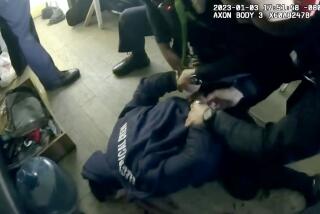Conviction Reduced in Pipe Bomb Explosion : Courts: The action could make Donald Lee Morse eligible for parole in less than two years. Two officers were killed trying to defuse a device in 1986.
- Share via
A state appeal court, citing improper jury instructions, has reduced the first-degree murder conviction of a North Hollywood man in the deaths of two police officers killed while trying to defuse a pipe bomb in his garage.
The 2nd District Court of Appeal’s decision to reduce the conviction to second-degree murder, if upheld, could make Donald Lee Morse, 42, eligible for parole in less than two years, prosecutors said Tuesday.
Morse, a Hollywood makeup artist, is serving life without the possibility of parole for his first-degree murder conviction in the Feb. 8, 1986, bomb deaths. The maximum penalty for second-degree murder is 15 years to life.
In April, 1989, a San Fernando Superior Court jury deliberated less than five hours before convicting Morse of murder in the deaths of Detective Arleigh McCree, 46, and Officer Ronald Ball, 43.
In selecting the higher degree of guilt, jurors relied on instructions from Judge John H. Major that mere possession of a destructive device was sufficient to elevate a homicide from manslaughter to second-degree murder or even first-degree murder if they so decided.
“The judge said in effect that you could use the bomb possession twice,” said Morse’s attorney, Philip I. Bronson, “and that’s what the appeal court threw out.”
In its ruling, the three-judge panel said the effect of Major’s instructions was to relieve prosecutors of the obligation to prove “malice aforethought” to secure a first-degree conviction.
One of the three judges, Earl Johnson Jr., wanted to throw the murder convictions out entirely.
In a strongly worded separate opinion, Johnson said that he agreed with several points of appeal raised by the defense, chiefly the argument that Morse’s lawyer was incorrectly barred from introducing evidence that the officers caused their own deaths through carelessness.
Deputy Dist. Atty. Sterling E. Norris, who prosecuted the case, said it would take prosecutors up to three months to study the complex ruling and decide whether to appeal it to the California Supreme Court, retry Morse for first-degree murder or accept the second-degree conviction.
Under state law, defendants convicted of second-degree murder are eligible for parole after serving half of the 15-year minimum sentence.
But Norris said he remained optimistic that, if required to, prosecutors could prove that Morse acted maliciously.
Norris said that two of the three judges seemed to imply that the evidence suggested malice when they wrote in their opinion that possession of a bomb in a residential area was “inherently dangerous . . . with a high probability of death.”
Morse did not testify at his trial, but he told police at the time of the explosion that he had never seen the bombs found in his garage.
His estranged brother-in-law, however, testified that 10 days before the blast Morse had threatened to blow him up with a bomb.
Police also testified that Morse’s fingerprints were on a coffee can containing blasting powder that was found by police in a kitchen cabinet.
Investigators also said that in Morse’s bedroom they found shotgun shells similar to those used in another bomb that McCree and Ball dismantled minutes before the explosion.
Police said they went to Morse’s house to search for a pistol that had been used four days earlier to shoot an official of the Makeup Artists and Hairstylists Union, Local 706, of which Morse was a member. The pistol was not found and Morse was not charged in the shooting.
More to Read
Sign up for Essential California
The most important California stories and recommendations in your inbox every morning.
You may occasionally receive promotional content from the Los Angeles Times.










